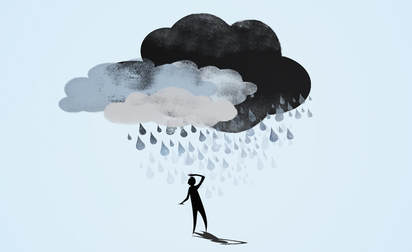Vitamin D Supplementation May Help Ease Depression

NEW YORK — Vitamin D supplementation may help reduce depressive symptoms, new results of an updated meta-analysis show.
"People who were vitamin D deficient and depressed seemed to respond best to supplementation, but there was some evidence that supplementation improved depressive symptoms in people who had a normal level of vitamin D," Marissa Flaherty, MD, of the Department of Psychiatry, University of Maryland School of Medicine in Baltimore, told Medscape Medical News.
Globally, more than 300 million people suffer from depression. It's the number one cause of years lost to disability worldwide. In the United States, the overall prevalence of vitamin D deficiency hovers around 42%, with the highest rate seen in blacks.
"In my third year of residency, I noticed that a lot of my depressed patients had very low vitamin D levels, and when I supplemented their vitamin D, their depressive symptoms, particularly their fatigue and energy levels, would improve," Flaherty said.
To investigate further, Flaherty and her colleagues conducted a systematic review and meta-analysis of five randomized controlled trials published from 2011 to 2016 that examined the effect of vitamin D supplementation (vs no supplementation) on depressive symptoms, as measured by the Beck Depression Inventory and Hamilton Depression Rating Scale.
The number of participants in these studies ranged from 40 to 746. The type and route of vitamin D supplementation varied, as did the study length (from 3 to 52 weeks) and the results. For example:
A 6-week study published in 2011 found no effect of daily supplementation with 5000 IU cholecalciferol on ratings of depression in a group of young healthy adults.
An 8-week study published in 2013 found that daily supplemention with 1500 IU vitamin D3 plus 20 mg fluoxetine was superior to fluoxetine alone in controlling depressive symptoms in patients with major depressive disorder (MDD).
A 3-month study found that two single intramuscular injections of 150,000 or 300,000 IU vitamin D improved depression ratings in depressed adults with vitamin D deficiency.
An 8-week study found that weekly supplementation with 50,000 IU oral vitamin D improved depression scores in patients with MDD.
A 52-week study found that weekly supplementation with 50,000 IU vitamin D3 did not significantly lower depressive symptoms in depressed dialysis patients.
In the pooled data analysis, Flaherty and her colleagues found that vitamin D supplementation improved depressive symptoms, with a medium overall effect size (SMD, 0.495; 95% confidence interval [CI], 0.190 - 0.801; P = 0001).
I think all doctors should check vitamin D levels and supplement when needed. Dr Marissa Flaherty
www.medscape.com/viewarticle/896449
"People who were vitamin D deficient and depressed seemed to respond best to supplementation, but there was some evidence that supplementation improved depressive symptoms in people who had a normal level of vitamin D," Marissa Flaherty, MD, of the Department of Psychiatry, University of Maryland School of Medicine in Baltimore, told Medscape Medical News.
Globally, more than 300 million people suffer from depression. It's the number one cause of years lost to disability worldwide. In the United States, the overall prevalence of vitamin D deficiency hovers around 42%, with the highest rate seen in blacks.
"In my third year of residency, I noticed that a lot of my depressed patients had very low vitamin D levels, and when I supplemented their vitamin D, their depressive symptoms, particularly their fatigue and energy levels, would improve," Flaherty said.
To investigate further, Flaherty and her colleagues conducted a systematic review and meta-analysis of five randomized controlled trials published from 2011 to 2016 that examined the effect of vitamin D supplementation (vs no supplementation) on depressive symptoms, as measured by the Beck Depression Inventory and Hamilton Depression Rating Scale.
The number of participants in these studies ranged from 40 to 746. The type and route of vitamin D supplementation varied, as did the study length (from 3 to 52 weeks) and the results. For example:
A 6-week study published in 2011 found no effect of daily supplementation with 5000 IU cholecalciferol on ratings of depression in a group of young healthy adults.
An 8-week study published in 2013 found that daily supplemention with 1500 IU vitamin D3 plus 20 mg fluoxetine was superior to fluoxetine alone in controlling depressive symptoms in patients with major depressive disorder (MDD).
A 3-month study found that two single intramuscular injections of 150,000 or 300,000 IU vitamin D improved depression ratings in depressed adults with vitamin D deficiency.
An 8-week study found that weekly supplementation with 50,000 IU oral vitamin D improved depression scores in patients with MDD.
A 52-week study found that weekly supplementation with 50,000 IU vitamin D3 did not significantly lower depressive symptoms in depressed dialysis patients.
In the pooled data analysis, Flaherty and her colleagues found that vitamin D supplementation improved depressive symptoms, with a medium overall effect size (SMD, 0.495; 95% confidence interval [CI], 0.190 - 0.801; P = 0001).
I think all doctors should check vitamin D levels and supplement when needed. Dr Marissa Flaherty
www.medscape.com/viewarticle/896449
